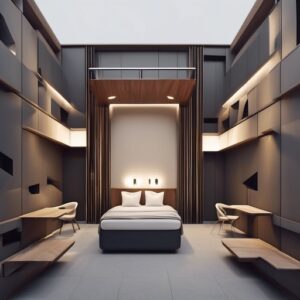In the ever-evolving landscape of the hospitality industry, hotels are constantly seeking innovative ways to enhance guest experiences, optimize operations, and remain competitive. Among the myriad of solutions available, one approach stands out for its efficiency, flexibility, and sustainability: modular buildings. While traditionally associated with construction sites and temporary structures, modular buildings are increasingly finding their place in the realm of hotels. In this article, we delve into the myriad benefits of modular buildings for hotels, exploring how they can revolutionize the industry and shape the future of hospitality.
Speed and Efficiency
Traditional construction methods are often plagued by delays, cost overruns, and logistical challenges. In contrast, modular construction offers a streamlined and efficient alternative. By prefabricating modules off-site in a controlled environment, construction can proceed concurrently with site preparation, significantly reducing overall project timelines. According to research by McKinsey & Company, modular construction can accelerate project delivery by up to 50%. For hotels looking to capitalize on seasonal demand or meet tight deadlines, this accelerated timeline can be a game-changer.
Flexibility in Design
Modular construction is not synonymous with cookie-cutter designs. On the contrary, modular buildings offer a high degree of customization and flexibility. Architects and designers can leverage modular construction techniques to create unique and visually striking hotel properties that cater to specific brand identities and guest preferences. From boutique hotels nestled in urban landscapes to expansive resort complexes overlooking pristine beaches, the design possibilities are virtually limitless. Moreover, modular buildings can easily accommodate future expansions or reconfigurations, ensuring that hotels can adapt to evolving market demands with minimal disruption.
Cost-Effectiveness
Cost considerations are paramount in the hospitality industry, where margins can be razor-thin. Modular construction presents a compelling value proposition, offering cost savings across various fronts. The controlled manufacturing environment of modular construction facilities minimizes material waste and labor inefficiencies, resulting in reduced construction costs. Additionally, the expedited construction timeline translates into savings on financing and operational expenses. For hotel developers and owners, modular construction represents an opportunity to achieve higher returns on investment while maintaining competitive pricing for guests.
Sustainability
In an era defined by growing environmental consciousness, sustainability has become a key priority for businesses across industries. Modular construction aligns seamlessly with this ethos, offering a more eco-friendly approach to building hotels. By optimizing material usage, minimizing construction waste, and promoting energy efficiency, modular buildings have a significantly lower environmental footprint compared to traditional construction methods. Furthermore, the ability to incorporate sustainable building materials and technologies into modular designs allows hotels to reduce their long-term operating costs while enhancing their appeal to environmentally-conscious travelers.
Quality and Consistency
Contrary to common misconceptions, modular buildings are not synonymous with compromise in quality. On the contrary, the controlled manufacturing environment of modular construction facilities ensures consistent quality standards across all modules. Each component undergoes rigorous quality control measures, resulting in superior craftsmanship and structural integrity. Additionally, the use of standardized building practices and advanced technology further enhances the reliability and durability of modular buildings. As a result, hotels can deliver a consistently high level of comfort and satisfaction to guests, thereby enhancing brand reputation and driving repeat business.
Resilience and Adaptability
The COVID-19 pandemic has underscored the importance of resilience and adaptability in the hospitality industry. Modular buildings offer inherent advantages in this regard, thanks to their modular nature and off-site construction process. In times of crisis or unforeseen circumstances, hotels can quickly deploy modular units to accommodate changing needs, such as temporary housing for displaced individuals or additional healthcare facilities. Furthermore, the flexibility of modular construction allows hotels to easily reconfigure spaces to comply with evolving health and safety regulations, providing guests with peace of mind and reassurance.
Conclusion
As the hospitality industry continues to evolve in response to shifting consumer preferences, technological advancements, and global challenges, hotels must embrace innovative solutions to stay ahead of the curve. Modular buildings represent a paradigm shift in hotel construction, offering unparalleled speed, flexibility, cost-effectiveness, sustainability, and quality. By harnessing the potential of modular construction, hotels can unlock new opportunities for growth, differentiation, and resilience in an increasingly competitive landscape. As pioneers in the adoption of modular buildings, hotels can redefine the guest experience, shape the future of hospitality, and set new standards of excellence for generations to come.


